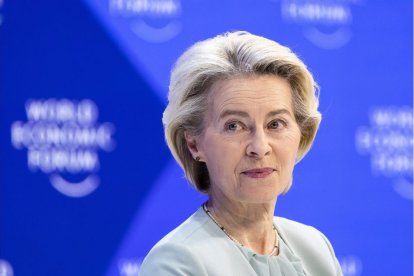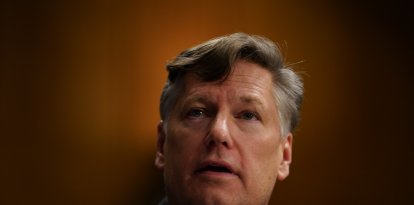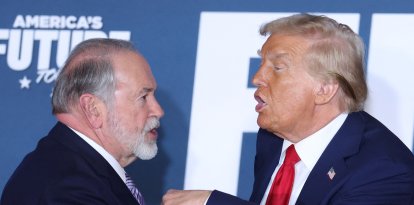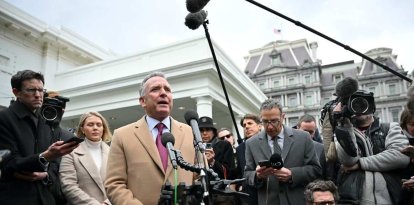Von der Leyen or the victory of the un-elected
The prevailing consensus among European elites is undergoing an unprecedented erosion from the bottom up. However, the president of the European Commission either does not see this or does not care. After all, her power has never come from popular mandate and empathy is not her strong suit.

(Cordon Press- Hannes P. Albert/dpa
Just a few months before Ursula von der Leyen was elected president of the European Commission in 2019, polls showed her as the politician with the worst image in Angela Merkel's cabinet. Her name was linked to countless scandals, including accusations of nepotism during her time as Minister of Defense. There were many theories as to why she reached the highest position in the EU. Some analysts claimed that her nomination meant not having a too dominant figure in Brussels, while others claimed that she had a solid bureaucratic pedigree that made her trustworthy. Ursula Gertrud Albrecht was born in 1958. She grew up in a southern suburb of Brussels, in a traditional family of civil servants, politicians and bureaucrats.
She studied Medicine in Hannover and practiced there until 1992. She married Heiko von der Leyen in 1987 and had seven children. She was a housewife until 1996 when she returned to medical school and obtained a master's degree in public health in 2001. Her political career began in 2003 when she won a seat in the state elections and from there she became Minister of Social Affairs, Women, Family and Health in Lower Saxony and then joined Merkel's administration as Minister of Family Affairs, Senior Citizens, Women and Youth in 2005. In Merkel's second government, she was Minister of Labor and Social Affairs and later Minister of Defense from 2013 to 2019. Her time at the European Commission has meant a chain of mistakes, starting with the European economy. Europe's performance was poor in the last five years, widening the gap with the United States and China noticeably. The main European economies performed poorly and worse when compared to other leading countries.
Over the past five years, there has been a spree of damaging debt coupled with policies of economic contraction and deindustrialization in Europe, all under the leadership of von der Leyen. These measures have adversely affected the continent, while stringent regulations have diminished the quality of life of Europeans. Under von der Leyen's tenure, the European Union has not only fallen behind but shows little promise of a swift recovery. European welfare states are heavily intervened in and controlled with regulations originating more from Brussels than from national parliaments, which are the true representatives of democracy. The continent has become reliant on imports for energy, military and industrial equipment, while green policies have endangered its agricultural and food sectors.
The solid Eurocratic network supporting Ursala von der Leyen's new candidacy for another five years at the helm of the Commission argues that these are times of unity, citing her centrism as something valuable against the extremist shifts and asserting that a new mandate promises stability. However, these arguments ignore the widespread suffering experienced by most Europeans during her administration, with less than 35% approval of her decisions. One of her most contentious policies under her leadership is the “Green New Deal," a radical climate agenda forcibly implemented across Europe. This deal was designed to position her as a global leader in climate policy, introducing protectionist carbon taxes and subsidy packages that overshadowed conventional governance approaches.
It is important to highlight her exemplary strategy known as "From Farm to Table," which unleashed an avalanche of regulations that ruined European agriculture. and sparked a wave of protests in France, Spain and Germany, leading to angry marches by farmers. A particularly unusual incident involved the sudden reversal of stringent regulations under the Habitats Directive that von der Leyen had championed, which had overly restricted farming activities and property rights in a zealous conservation effort. However, what prompted this reversal was not a newfound understanding of the law's implications but rather a personal tragedy: the death of Ursula's cherished family pony in a wolf attack. This event notably shifted her stance on animal policies, overshading the ruin, despair and protests of thousands of farmers.
There is practically no individual right that his administration has not attempted to undermine (almost always successfully). Europeans are less free today and regulations intervene more aggressively in their private lives. But if there is an obsession that distinguishes von der Leyen, it is that of curtailing freedom of expression. Despite the multiple problems that afflict Europeans, according to the EU, the existential threat to democracy is the spread of fake news, which governments use to arrogate to themselves the ability to dictate what the truth is and crush dissent around their ideological and administrative narrative. Ursula's dwindling popularity plummeted when she targeted the internet with the excuse of child protection. She created her own totalitarian structure of control of expression, with a swarm of censorship laws such as the Digital Services Act, the Media Freedom Act and the Artificial Intelligence Act.
A transparency report revealed that the European Commission was tracking and suppressing content related to Euroscepticism or interest in right-wing European politicians. In doing so, the Commission not only violated EU privacy rules but also spread false information, the very "fake news" they claim to protect citizens from. One such claim stated that 87% of Europeans supported internet monitoring, despite independent polls showing no such support among the European population.
Although the EU likes to talk about digital sovereignty, evidence suggests that overregulation is causing Europe to fall behind China or the U.S. in the new technology industry. In a report, experts highlight the dangers of the EU's hyperregulation, calling for a comprehensive review of policies related to start-ups, innovation and risk-taking. The European Commission has amassed extraordinary power. including crisis management mechanisms for events like the Russian invasion of Ukraine. These mechanisms, however, are anticipatory, allowing the Commission to unilaterally declare a crisis based on an "objective risk of serious harm to public safety or health." This broad definition enables arbitrary intervention across various domains. The risks of this approach are evident in how von der Leyen wields these powers as tools against ideological opponents, such as during Meloni's election campaign and in conflicts with Poland and Hungary. Conversely, she tends to overlook transgressions by allies and for convenience, such as ignoring the growing institutional abuses of the Spanish government.
The authoritarian drift imposed in these five years has generated a climate of high-risk political intolerance. Several mayors of Brussels tried to prevent this from taking place. If re-elected for a second term, von der Leyen herself has pledged to establish a new unit dedicated to detecting and removing online disinformation called European Shield of Democracy, a name that seems like it was created for a low-class comic, or that could well be used by any tyrant in the Putinist orbit to persecute opponents with the everlasting excuse of combating foreign interference and manipulation.
Speaking of tyrannical episodes, a scandal broke out in the middle of her administration. During her murky and still not sufficiently investigated the handling of anti-Covid policies, it was revealed that Ursula had excessively spent taxpayers' money on consultants, and numerous investigations and journalistic reports were carried out due to her relationship and actions with pharmaceutical companies. When a parliamentary inquiry into the awarding of consulting contracts was launched, von der Leyen's cell phone data had been magically eliminated and she claimed that she “didn't know anything about this." The Corporate Europe Observatory, an NGO dedicated to investigating the relationship between European politicians and lobbies, claimed that the European Commission had never “reached such a level of opacity as what we are currently seeing with pharmaceutical companies.”
Brussels boasts of being a “ regulatory superpower” as if this were a gift or something to be proud of. Under von der Leyen's administration, there was a concerted effort to enhance the power of the Brussels bureaucracy. This increase in authority has primarily been used to intervene, control and maintain the mechanisms that secure her continued grip on power, often bypassing democratic will and relying on the bureaucratic elite's corporate connections. In recent elections, Europeans sent a clear message to Brussels' entrenched leadership by electing a record number of politicians opposed to the Eurocratic establishment. The turmoil has shaken the ruling parties of several member states, revealing a significant shift toward right-wing parties. These victorious parties share a common disdain for von der Leyen's perceived overreaches, particularly in immigration, climate and energy policies.
But while it is true that when Europeans go to the polls they say one thing, it is no less true that their elites, behind the curtains, end up doing another. The history of the EU and its previous versions is full of these examples and, in light of the latest meetings aimed at appointing the next generation of officials, it seems that a new betrayal is looming. Before the elections, von der Leyen dedicated herself to seducing right-wing figures in case they helped her re-election, turning her speech into what the right wants to hear. Giorgia Meloni was one of the chosen ones. After her resounding victory in the European elections, she must have thought that her new closeness to von der Layen would ensure her a place at the table. But it was quickly pushed aside when Ursula's party saw that it had a chance to make an agreement with socialism...and even with the Greens instead of the right ring-
As turnout in European elections has risen, so has support for parties opposing the EU establishment. These elections have also debunked several myths about anti-establishment voters. Portraying them as extreme racists or reactionaries is not only outdated but also offensive. While right-wing parties achieved their best results in the European Parliament election and made significant gains, they are unlikely to succeed in shifting the EU's political and economic priorities. Naivety, complacency in exchange for funds and internal divisions pose challenges for these electoral winners but do not seem to pose a significant threat to von der Leyen's agenda. Ultimately, hers is the agenda of a well-equipped and entrenched elite willing to do whatever it takes to maintain its influence.
EU leaders failed to reach an agreement on the re-election of Ursula von der Leyen as president of the EU Commission during the first round of Council negotiations last Monday, primarily due to the arrogance and self-interest of von der Leyen's party. However, the political maneuvering has already begun. Negotiations between the two largest blocs: the European People's Party led by von der Leyen and the Social Democrats will aim to sideline the true winners. They may employ a narrative similar to that used successfully in Spain, where disparate and unpopular factions united to prevent "the right from governing.” Von der Leyen's Brussels will do everything in its power to disregard election results or the will of European voters, leveraging the power and influence amassed over five years. Clearly, she is adept at navigating this complex political landscape.
Giorgia Meloni, leader of the European Conservative and Reform group, complained about being marginalized and questioned the round of negotiations, and Viktor Orbán agreed. “They don't care about reality, they don't care about the results of the European elections and they don't care about the will of the European people," posted the Hungarian Prime Minister. Citizens have used these elections to express their discontent, both to local rulers and to the bureaucracy that they do not elect except in a distant and subterfuge way, by which they do not feel represented but rather attacked. The prevailing consensus among European elites is undergoing an unprecedented erosion from the grassroots level within the history of the EU. However, von der Leyen Castle either does not see this, or she simply does not care. After all, her authority has sever stemmed from popular mandate and empathy is not her strong suit.
European politics urgently needs to democratize. Calling the popular will populism and ignoring the voice of the polls when they do not endorse what the elites want has a name, and it is not exactly called democracy. Brussels cannot hide from reality forever and five more years of Ursula's authoritarian myopia will lead to a dark future. The elections clearly show that the apparatus of control and handouts designed by von der Leyen failed to contain voters' anger. But European voters do not vote for the president of the Commission or the rest of the authorities. That is the kingdom of those who are not chosen by the people. European leadership needs to be brought under control because the essence of liberal democracy is control over power. Citizens and their individual rights need to be at the center of the European community system, or Europe will become irrelevant.
RECOMMENDATION





















